Decrees ready for Rome
National
During the second assembly of the Fifth Plenary Council of Australia, more than 35 motions were put to a consultative and a deliberative vote.
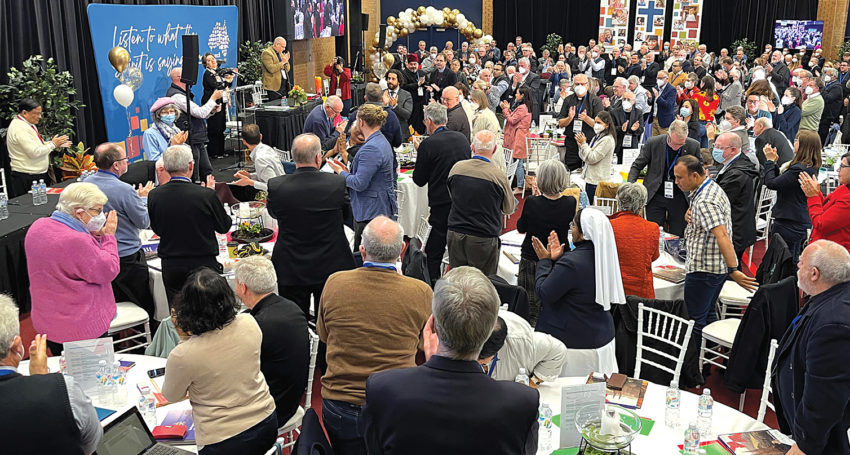
Those motions that received a qualified majority in the deliberative vote were passed by the Plenary Council. They were confirmed as the decrees of the Plenary Council (summarised below). After the November 2022 meeting of the Australian Catholic Bishops Conference, the decrees will be sent to the Apostolic See for review.
RECONCILIATION: HEALING WOUNDS, RECEIVING GIFTS
Each Catholic school, parish, diocese, eparchy or organisation will:
- acknowledge in a prominent and appropriate manner the Traditional Custodians of the land upon which their buildings stand;
- include an online cultural competency course in the orientation and ongoing formation of staff and volunteers to enable more effective and appropriate ministry;
- ensure that any retreats and other formation activities offered are culturally appropriate;
- work actively to include Aboriginal and Torres Strait Islander people on its committees, boards and decision-making bodies.
The advisory councils of the Bishops’ Commission for Liturgy, in partnership with the National Aboriginal and Torres Strait Islander Catholic Council, will develop options for the liturgically and culturally appropriate use of Aboriginal and Torres Strait Islander symbols and rituals in Catholic liturgical contexts, with respect for the diversity of Aboriginal and Torres Strait Islander cultures.
CHOOSING REPENTANCE – SEEKING HEALING
To express more fully the aims of the annual ‘Safeguarding Sunday’, in consultation with those who have been harmed by abuse:
- a new name will be adopted for ‘Safeguarding Sunday’;
- the Bishops Commission for Liturgy will develop appropriate rituals and liturgical resources to be offered to parishes for use on the day.
CALLED BY CHRIST – SENT FORTH AS MISSIONARY DISCIPLES
Those responsible for Catholic schooling and early childhood education, in consultation with representatives of Catholic parents’ groups and parish-based organisations, led by the National Catholic Education Commission, establish a national forum, which will seek to:
- identify and respond to the needs of the diverse and distinct circumstances of Catholic schools in Australia;
- build partnerships which enhance the vision of Catholic education as an instrument of evangelisation and an essential dimension of the contemporary mission of the Church;
- offer a process for critical reflection and discernment of the vocation of Catholic education today;
- support formation opportunities for catechesis, faith formation, leadership development and religious education pedagogy;
- assist parish engagement with schools and young people.
The Bishops Commission for Social Justice, Mission and Service establish a triennial national forum of Catholic social service, health and aged care, disability, prison ministry, refugee and asylum-seeker, and justice, ecology and peace organisations and representatives of those served by these organisations; and that the purpose of this forum include:
- providing opportunities for dialogue that will contribute to the ability of the Church in Australia to attend to ‘examining the signs of the times and interpreting them in the light of the Gospel’;
- identifying and exploring priorities for evangelisation through outreach, service provision, advocacy and formation;
- addressing gaps;
- seeking opportunities for collaboration;
- informing the development of local social teachings to be issued by the Australian bishops.
That each diocese and eparchy identify ways of promoting appropriate ecumenical and interfaith initiatives.
That the Bishops Commission for Christian Unity and Inter-religious Dialogue – in collaboration with Catholic tertiary institutions and theological associations – provide guidance, advice and resources to dioceses and eparchies for ecumenical and interfaith dialogue and relationships, and formation.
WITNESSING TO THE EQUAL DIGNITY OF WOMEN AND MEN
The Plenary Council commits the Church in Australia to ensuring:
- through formal policies and intentional practice, the experiences and perspectives of women, including women who exercise ministry, are heard, considered and valued at local, diocesan and national levels. This is particularly important for matters which affect them distinctively;
- that women are appropriately represented in decision-making structures of Church governance at the parish, diocese or eparchy, and national level, and in Church agencies, entities and organisations;
- that dioceses and eparchies recognise and value publicly, and properly remunerate, women who lead and serve in the Church in various ways.
Each Australian diocese and eparchy commits to supporting, with appropriate formation and recognition, new opportunities for women to participate in ministries that engage with the most important aspects of diocesan and parish life.
The Plenary Council commits the Church in Australia to implementing more fully the undertakings made by the bishops in their Social Justice Statement, Woman and Man: The Bishops Respond (2000), in response to the research report Woman and Man: One in Christ Jesus (1999).
Advertisement
Should the universal law of the Church be modified to authorise the diaconate for women, the Plenary Council recommends that the Australian Bishops examine how best to implement it in the context of the Church in Australia.
COMMUNION IN GRACE: SACRAMENT TO THE WORLD
Dioceses promote exercise of and formation for the ministries of Lector, Acolyte and Catechist.
In the light of the change in circumstances over the past 20 years, the ACBC review the provisions and guidelines it issued in May 2003 for lay people to participate in a formal ministry of Preaching in the Latin Church, as provided for in canon 766 of the Code of Canon Law.
The Bishops’ Commission for Liturgy institute a sustained program of catechesis of the Sacrament of Penance to promote an understanding of the conditions for, and appropriate practice of, each of the three forms of the Rite of Penance.
The Plenary Council request that the Holy Father consider whether the Third Form of the Rite of Penance might have wider use on occasions when it is particularly appropriate, granted an understanding among the faithful of its distinctive nature and requirements.
FORMATION AND LEADERSHIP FOR MISSION AND MINISTRY
Each diocese and eparchy develop or strengthen strategic policies grounded in fidelity to the Gospel and closeness to Jesus Christ, to identify and support ministry and leadership formation. These will:
- acknowledge the generational, cultural and ethnic diversity of the contemporary Church in Australia;
- recognise the changing community profile of many parish and faith communities, incorporating an awareness of and outreach to those beyond these communities;
- enhance knowledge and skills for participating in local churches’ structures and processes for consultation, dialogue and decision-making;
- address the particular needs of clergy, with focuses on initial formation and selection processes, and ongoing support and formation;
- include strategies for initiation, ongoing formation and appropriate forms of mentoring and accompaniment (human, spiritual, intellectual and pastoral) that foster collaboration and are grounded in adult education principles;
- provide ongoing support and strategies for those who minister to young people;
- support opportunities for Aboriginal and Torres Strait Islander Catholics to undertake formation and training, ensuring that local circumstances and social data are taken into account;
- consider avenues for financial support through scholarships, sponsorships and grants.
The ACBC commission the Australian Catholic Biblical Association and the Australian Catholic Theological Association to liaise with appropriate Catholic and diocesan agencies, institutions and educational providers in order to enhance cross-institutional engagement and development of resources and formation programs. The design of these resources and programs will carefully consider the needs of rural, remote, and regional areas and creatively assess the use of available technology in order to improve delivery and accessibility.
The ACBC establish a working group with expertise in formation to develop national formation for leadership strategies and guidelines designed for clergy, religious and lay leaders to address the possibilities and challenges of synodal leadership in parishes and diocesan and eparchial agencies and support the Church’s work of evangelisation. These strategies and guidelines will:
- have a national scope and be adaptable to local circumstances;
- aim to enhance competencies in leadership and commitment to synodal practices, with a focus on building communities that are welcoming to all, with particular attention to those on the margins of society and the
Church; - identify and promote models of effective engagement with government and civil society;
- ensure leaders are formed in scripture, tradition and ecclesiology;
- foster a spirituality of leadership through personal and communal prayer, connection to the sacramental life of the church, and commitment to service.
The ACBC establish a working group with expertise in Catholic Social Teaching to develop a national framework for formation in Catholic Social Teaching that will encourage, support and expand the offering of programs in Catholic Social Teaching. This framework will emphasise the social dimension of the Church’s mission, incorporating contemporary analysis of the Australian context, with a particular focus on the formation requirements of leaders in Catholic social service, health and aged care organisations, Catholic education and dioceses.
Advertisement
AT THE SERVICE OF COMMUNION, PARTICIPATION, AND MISSION: GOVERNANCE
Dioceses and eparchies support parishes to establish and strengthen appropriate synodal structures by developing guidelines and providing resources for the flourishing of Parish Pastoral Councils, Parish Finance Committees, and other parish bodies.
Representatives from the ACBC, Catholic Religious Australia and the Association of Ministerial Public Juridic Persons form a working group to conduct appropriate and broad consultation, to develop and establish a National Catholic Synodal Life Roundtable, to foster, assess, and report periodically on the development of synodal leadership across the Church in Australia. The roundtable will bring together representative members of those groups with Diocesan Pastoral Councils and other key national bodies of the Church, including Catholic social and community services, health, and education.
The National Centre for Pastoral Research be commissioned to study the implementation of recommendations from The Light from the Southern Cross which has already happened, to identify examples of effective initiatives that have been taken and promote further implementation of those recommendations judged helpful and practicable.
INTEGRAL ECOLOGY AND CONVERSION FOR THE SAKE OF OUR COMMON HOME
By 2024, each Catholic parish, diocese, eparchy, educational institution or organisation commits to joining the Laudato Si’ Platform; and by 2030 either develops its own or participates in an established Laudato Si’ Action Plan that includes a public commitment, governance model and a mechanism for listening to the ecological wisdom of Aboriginal and Torres Strait Islander Peoples.
The complete set of decrees, and accompanying introductory statements can be found at www.plenarycouncil.catholic.org.au


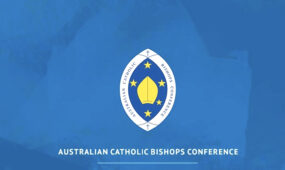
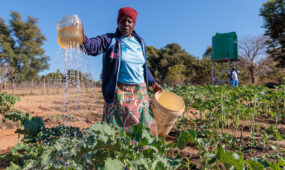
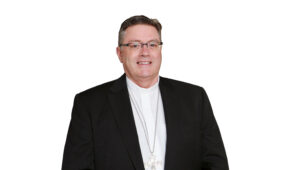
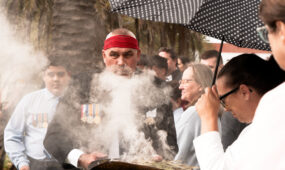

Comments
Show comments Hide comments